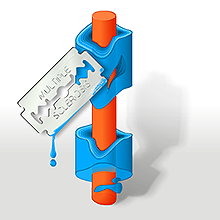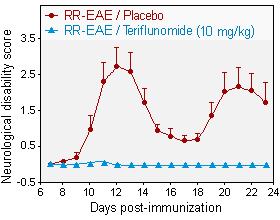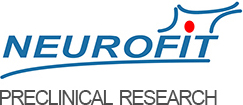Newsletter # 86

Animal models
It was initially used to treat
-
Relapsing remitting form of MS is reproduced in experimental autoimmune encephalomyelitis in rats (RR-EAE)
following immuzation with a homologous spinal cord homogenate.
-

-
After 8 days, the first sign of neurological symptom is observed (red curve).
The peak of disability occurs around day 13 which is immediately followed by a spontaneous remission.
A disease relapse appears after about 18 days with a peak around day 21-22.
Daily oral Teriflunomide (10 mg/kg) initiated at the time of symptom onset (Day 8) fully prevents the occurrence of any significant disease disability (blue curve).
-
We look forward to hearing from you.
Get in touch


 PREVIOUS
PREVIOUS